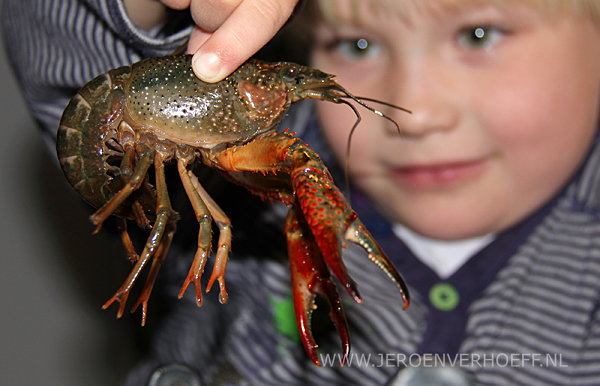Jeroen Verhoeff, Wildlife Artist
The invasion of the unstoppable aliens has begun!

- .
- Crayfish
- .
- One species of crayfish once occurred in the Netherlands. This has completely disappeared except for one isolated pond. We now have more than seven types of lobsters from abroad. Three types of them are doing well, we may already be talking about millions of copies.
- .
- Cute pets
- My brother once brought marbled crayfish home from his son’s school aquarium. They had enough of those easy-to-keep critters anyway. I did not know the species and after investigation it turned out that no one knew the species; the animal was first discovered in an aquarium shop. Where he comes from is a mystery. The marbled crayfish is extra special, because he, or rather she, can reproduce without a man. So I was terrified that the marbled crayfish was going to be invasive here too. Fortunately it looked like a warm water species, but still; nature sometimes knows how to adapt surprisingly quickly.
- .
- Overland walkers
- .
- The red American crayfish (photo) can walk over land to colonize new waters. This allows it to reach all kinds of isolated pools and ponds where the native frogs and salamanders are likely to be virtually defenseless. Earlier this year I was finally able to actually do something and I won second prize in a competition for who invented the best exotic crayfish trap. But even if this plan is well executed, it remains to be seen whether it will have any serious effect, because the huge problem with many invasive exotics is that once they are there, you often can’t get rid of them anymore.
- .
- Megamonstermoms
- .
- Now it appears that the marbled crayfish is multiplying and spreading explosively in a number of ponds near Nijmegen. It has also been established that this species can also happily walk on land. We could quickly stop this invasion by draining the pools and catching and destroying all the crayfish before they can spread even further. In addition, there should be a stricter ban on trading and actually also a general obligation to kill. Maybe we can still stop this species. Just maybe. In Madagascar it is already a huge ecological disaster and they are already present in Japan, Croatia, Hungary, Ukraine and the Czech Republic.
- .
- Natural disasters
- .
- For about fifteen years I have been reporting about the great danger of invasive exotic species. Hunting, overfishing, clearing and environmental pollution have all been terrible, but in many cases these disasters are still somewhat or even surprisingly reversible. Invasive exotics seem harmless to many people, but again, the huge problem with many invasive exotics is that once they are there, you often never get rid of them. Fortunately more and more people realize this very slowly, but in many cases we will be too late. It takes long-term vision to tackle these types of potential problems in time, and we are simply just not very good at that.
- .
- .
Webdevelopment by Lucas van Dongen / Departamento B
